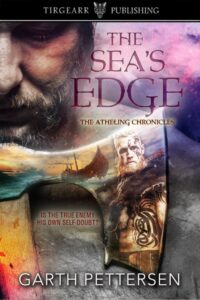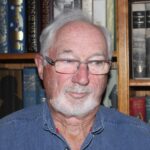Writer Garth Pettersen helps me kick off a new week but chatting about the newest release in his Atheling Chronicles historical fiction series, The Sea’s Edge.

Bio:
Garth Pettersen is an award-winning Canadian writer living in the Fraser Valley near Vancouver, BC., where he and his wife board horses. Pettersen has a BA in History from the University of Victoria and is a retired teacher. His short stories have appeared in anthologies and in journals such as Blank Spaces, The Spadina Literary Review, and The Opening Line Literary ‘Zine. Garth Pettersen’s historical fiction series, The Atheling Chronicles, is published by Tirgearr Publishing and is available on most online outlets.
Welcome, Garth. Please tell us about your current release.
My new book, The Sea’s Edge, is book #4 in my historical novel series The Atheling Chronicles. My protagonist is Harald Harefoot (he must have been a fast runner), a little-known historical figure. Harald was the middle son of King Canute, who in the early eleventh century was king of England, Denmark, and parts of Norway.
Little is known of the historic Harald, but I fashion him as a decent man with little ambition to rule. He deeply loves his Frisian wife Selia and tries to live a quiet life as a small landholder. Though he tries to ignore the fact that although he is not the direct heir to the throne, he is in line. When his father, the king, shows up unexpectedly at their steading in Mercia, Harald knows something is in the wind. Canute wants him to sail to Dublin to strengthen their Norse/Irish alliance and coordinate an attack on The Kingdom of Gwynedd in north Wales, unseating the king and placing a puppet on the throne. Harald is reluctant to leave Selia who is unwell, but feels he has to obey his father-king, and he assures her he will not have to do any actual fighting.
In Dublin, Harald makes a grave error and to make up for it he agrees to lead the attack on Gwynedd. As Harald becomes more involved with the mission, he begins to admire his foe, King Rhydderch of Gwynedd more than the allied leaders. He must complete an endeavour that goes against his conscience or face his own ruin.
At home, Selia befriends a young and attractive ale-scop (traveling poet). When he is accused of theft, she finds character witnesses in his defence, though she harbours a niggling doubt about his innocence.
Both Harald and Selia face moral dilemmas as well as challenges to their loyalty to each other.
What inspired you to write this book?
In writing this series, I am always looking for situations my protagonist can face, places he might travel to, and historical events happening during his lifetime. I do extensive research and I found a reference to King Canute’s attempting to keep the Welsh kingdoms from becoming too strong on England’s border. Digging deeper I discovered an attack on north Wales by a combined Dublin-England force. So, I thought, what if (Stephen King’s “what if…”) Harald was sent to make sure all went well with that attack and got swept up in it? I also realized that although I could write decent fight scenes, I had never written a battle scene.
Excerpt from The Sea’s Edge:
I would like to think my joining the force on this flank helped unite the effort, for the Welsh defenders began to give way as we pressed them. Then above the battle-clamor rose the braying sounds of a Welsh horn. The men of Gwynedd knew the signal, for those who could break free from the battle, did so, running back toward the stakewall of the town. Those pinned by their opponents fought free or died in the trying.
“After them!” shouted Olaf, raising his axe.
A roar went up as our warriors surged forward to pursue the fleeing Welshmen. I ran as well, though perhaps not as headlong as our fighters. I wished to see how Rhydderch would re-group.
What passed next made me stop and stare wide-eyed. The relentless rain, which had steadily plagued both sides in the battle, now ceased. The cloud cover lifted and parted like ripped cloth. The light of the sun shone through for the first time this day, and illuminated the gate and stakewall of Aber Garth Celyn and the battlefield before it. Moreover, from the bodies of the dead and dying rose the wælmiste, the slaughter-mist. I was not alone in my wonderment, for many other warriors stood as awestruck as I. It was as if the Alwealda, the Wuldorfæder, had revealed himself. While the men of Gwynedd ran to regroup, we stood as still as stone.
* * *
What exciting project are you working on next?
I am working on the next book in the series. Harald and Selia are given a large landholding and face huge obstacles as they struggle to make a success of the venture. They also arrive just after a murder, which affects many of the tenants and workers on their holding. I’ve never written a mystery so this is a new challenge and one that is going to involve much re-working and re-writing, I’m sure.
When did you first consider yourself a writer?
Easy question. I’ve always been an avid reader, probably since I was seven, but when I was eleven, I won first place in a regional essay contest. The prize was $100—big money in those days. I had my picture in the local paper in Victoria, BC, Canada where I grew up. From that moment, I wanted to be a writer. The attention went to my head. I continued to write over the years. I had a professor at university tell me I should make my living writing children’s stories. I continued to write over the years, but infrequently—theatre reviews in small papers, etc. I taught elementary school for years (plus some high school English and Writing, but mainly elementary) and really enjoyed sharing my love for reading and stories. When I retired, I decided to write and to learn the ‘craft’ of writing. I started getting short stories published and was eventually able to get a novel accepted.

Do you write full-time? If so, what’s your workday like? If not, what do you do other than write and how do you find time to write?
I wish I could say I write full time, but I do try to write every day. My wife and I have an acreage where we board horses. I balance indoor computer work with outdoor chores and projects.
What would you say is your interesting writing quirk?
I really love history and language. I writing about the Early Middle Ages, I try to breakdown stereotypes and show the details of how the folk lived. I particularly like throwing in Old English forms of words. So you’ll read “wyf” instead of wife, “crawe” instead of crow, “fæder” and “mōdor”, rather than mother and father, and so on. Oh yes, and England is “Engla-lond.” I do provide a glossary of words.
As a child, what did you want to be when you grew up?
Mostly I wanted to be a writer, though in junior high and early high school I wanted to be a chemist (until the math got too hard).
Anything additional you want to share with the readers?
Two things. The first is I hope you’ll read the new book and then the whole series. The second is, if you love reading, try writing. Free yourself of expectations and self-criticism. Start with journal writing—thoughts and ideas, then try writing description of a scene—take a photograph with words–just one paragraph. Then make up a character and describe them. A story can come later. Reading and writing are so connected—and you draw from every book you’ve ever read and every movie you’ve ever watched. You are full of story.
Links:
Website | Tirgearr Publishing | Facebook | Amazon
